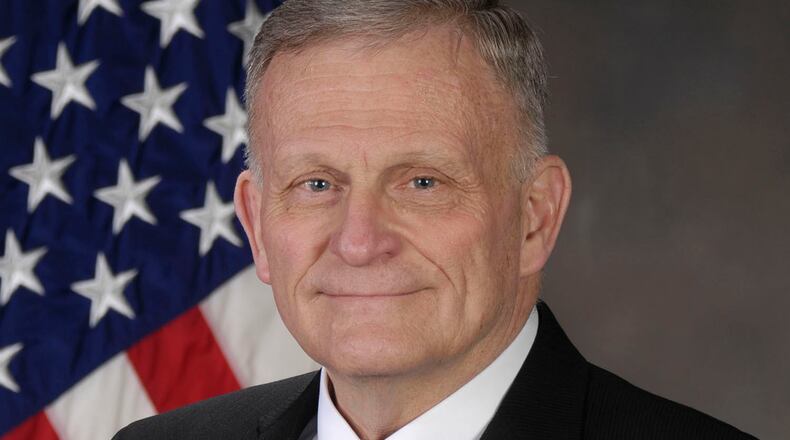Dr. Todd Stewart, a retired Air Force major general, university professor and homeland security expert, became the first civilian director and chancellor of AFIT in 2012.
Stewart addresses AFIT’s mission and its centennial celebration:
How has AFIT’s mission changed over the decades?
Stewart: It really hasn’t changed much. Its mission is to prepare military and civilian Airmen with the technical and application background to support our Air Force and its missions through education. The types of education have certainly evolved over the years from a very small class in 1919 to today, where AFIT has four schools (Civil Engineer, Graduate School of Engineering and Management, School of Strategic Force Studies, School of Systems and Logistics) here at Wright-Patterson AFB; and AFIT students assigned to more than 350 civilian institutions studying in programs not available at the Wright-Patt campus – including almost 2,000 medical students. That’s quite an evolution in our role.
AFIT this year will touch more than 30,000 military and civilian Airmen in one way or another around the world.
How has technology changed AFIT’s mission? What influences has it had?
Stewart: Certainly with the evolution of technology from its earliest stages after World War I until today, the types of technology the military employs to do its various missions has evolved. Our role is to keep our Airmen up to speed on those evolving technologies and to some extent, develop those new technologies. Our graduate school has between 800 and 900 people doing master’s and doctoral work focused on research in terms of developing or applying technologies to Department of Defense missions.
What makes you proudest of AFIT?
Stewart: Absolutely the graduates! The real measure of AFIT’s contribution to the DOD and the nation is what our graduates do after they leave AFIT. Many have gone on to be senior leaders in the military and after their military career, to serve as senior leaders in industry and academic communities. I am proudest of what AFIT does to prepare people to do great things throughout the rest of their careers.
What kind of influence does AFIT have on the younger generation?
Stewart: Our students and faculty are heavily engaged in promoting careers and education in science, technology, engineering and mathematics – STEM areas. We visit schools in the Miami Valley to promote STEM education and careers, whether those young students choose to enter the military or not.
Faculty and students are strong supporters of the Wright-Patterson AFB Educational Outreach Office. During 2018 they volunteered 500 hours working with more than 5,051 students on STEM-related activities. As of Oct. 11, they have volunteered 241.5 hours with 4,474 students on STEM events such as Job Shadow Day, Career Days and science fair judging.
We also advocate that a military career is a great opportunity to do exciting work and achieve things that someone might not be able to do elsewhere.
What challenges does AFIT face?
Stewart: As with many organizations, resource and funding challenges are always a concern. Our No. 1 goal is to remain relevant to where the DOD and, in particular, the Air Force is going in the future. The continual challenge in that regard is to understand what the Air Force’s priorities are, what kind of talent will be needed in their military and civilian Airmen in the future, and to adjust our programs and research to meet those challenges. We want to be relevant and responsive to the Air Force as it evolves.
What is the anniversary celebration on Nov. 7 going to entail?
Stewart: This is going to be exciting. A centennial for any organization is a big deal, and we’re going to celebrate. We will basically stand down our normal activities and hold a day-long centennial symposium featuring prominent guest speakers, a panel of former astronauts – AFIT has been involved with the training of 30-plus astronauts – and many other leaders of government and industry.
In the evening, we’ll host an awards banquet where we celebrate the accomplishments of our current folks and alumni. Our principal speaker will be Maj. Gen. Carl Schaefer, Air Force Materiel Command deputy commander. We are looking forward to that as well.
How does AFIT “fit” as one of the tenant organizations at Wright-Patterson AFB?
Stewart: It’s important for us to be a part of the Wright-Patterson community, to work as we do in cooperation with other major organizations, such as AFMC, Air Force Life Cycle Management Center, Air Force Research Laboratory, National Air and Space Intelligence Center and 88th Air Base Wing. We are here to support; for Air Force members, military and civilian, they are eligible to attend any of our classes and courses – even our degree programs – at no cost. That’s quite a benefit.
Any final words?
Stewart: We are very, very proud of what has been achieved by our predecessors in our first 100 years, and we are looking forward to the second 100 years.
About the Author
